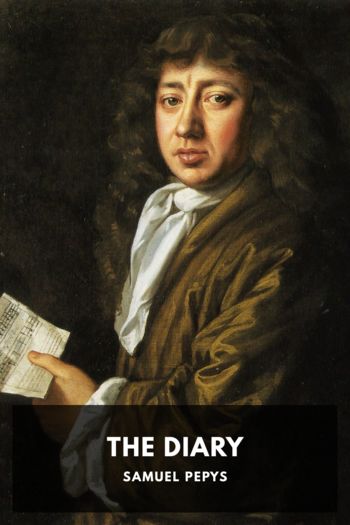The Diary, Samuel Pepys [e reader books TXT] 📗

- Author: Samuel Pepys
Book online «The Diary, Samuel Pepys [e reader books TXT] 📗». Author Samuel Pepys
See the letter of the Comte de Comminges to Louis XIV dated January 25th, 1663–64, (note 1848). ↩
Denzil, Lord Holles; see note 491. ↩
Clarendon Park, near Salisbury. See August 19th, 1661. ↩
See note 1157. ↩
There is a small volume in the Pepysian Library called Shibboleth, ou, Reformation de quelques Passages de la Bible, par Jean d’Espagne; Ministre du St. Evangile, printed 1653, and dedicated to Cromwell. —B. ↩
Humfrey Henchman, Bishop of Salisbury, succeeded Dr. Sheldon as Bishop of London, September, 1663. He died October 7th, 1675, aged eighty-three years. ↩
Lady Robinson was Anne, daughter of Alderman Sir George Whitmore, of Barnes, Surrey, Lord Mayor 1631. ↩
A committee was appointed in September, 1660, to consider the subject of the King’s revenue, and they “reported to the Commons that the average revenue of Charles I, from 1637 to 1641 inclusive, had been £895,819, and the average expenditure about £1,110,000. At that time prices were lower and the country less burdened with navy and garrisons, among which latter Dunkirk alone now cost more than £100,000 a year. It appeared, therefore, that the least sum to which the King could be expected to ‘conform his expense’ was £1,200,000.” Burnet writes, “It was believed that if two millions had been asked he could have carried it. But he (Clarendon) had no mind to put the King out of the necessity of having recourse to his Parliament.”
Lister’s Life of Clarendon, vol. ii, pp. 22, 23↩
By Charles Cotton, a voluminous author, but known now chiefly as the continuator of Walton’s Complete Angler. His Scarronides was first published in 1664. ↩
Gilbert Sheldon. ↩
See ante, October 12th, 1663. ↩
Many attempts to produce a satisfactory revolver were made in former centuries, but it was not till the present one that Colt’s revolver was invented. On February 18th, 1661, Edward, Marquis of Worcester, obtained Letters Patent for “an invencon to make certeyne guns or pistolls which in the tenth parte of one minute of an houre may, with a flaske contrived to that purpose, be recharged the fourth part of one turne of the barrell which remaines still fixt, fastening it as forceably and effectually as a dozen thrids of any scrue, which in the ordinary and usual way require as many turnes.” On March 3rd, 1664, Abraham Hill obtained Letters Patent for a “gun or pistoll for small shott, carrying seaven or eight charges of the same in the stocke of the gun.” ↩
Building by John Webb; now a part of Greenwich Hospital. Evelyn wrote in his Diary, October 19th, 1661: “I went to London to visite my Lord of Bristoll, having been with Sir John Denham (his Maties surveyor) to consult with him about the placing of his palace at Greenwich, which I would have had built between the river and the Queen’s house, so as a large cutt should have let in ye Thames like a bay; but Sir John was for setting it in piles at the very brink of the water, which I did not assent to and so came away, knowing Sir John to be a better poet than architect, tho’ he had Mr. Webb (Inigo Jones’s man) to assist him.” ↩
See note 1463. On November 13th, 1662, Pepys mentions the names of the members of the Commission. ↩
There had been recently established, under the Great Seal of England, a Corporation for the Royal Fishing, of which the Duke of York was Governor, Lord Craven Deputy-Governor, and the Lord Mayor and Chamberlain of London, for the time being, Treasurers, in which body was vested the sole power of licensing lotteries (The News, October 6th, 1664). The original charter (dated April 8th, 1664), incorporating James, Duke of York, and thirty-six assistants as Governor and Company of the Royal Fishing of Great Britain and Ireland, is among the State Papers. The duke was to be Governor till February 26th, 1665. ↩
George, nineteenth Lord Berkeley of Berkeley, afterwards Earl of Berkeley. ↩
A tragedy by Sir William Davenant, first acted at the Blackfriars Theatre, licensed 1635, printed 1643. ↩
Heraclius; or, the Emperor of the East, translated from the French of Corneille, by Ludovic Carlell. Pepys saw it again, February 4th, 1666–67, at the Duke’s Theatre. Carlell’s translation (4to., 1664) was, it is said, never acted. The play which Pepys saw was probably never printed. He saw it at the Duke’s Theatre. —B. ↩
Her dancing in The Slighted Maid is mentioned February 23rd, 1662–63. ↩
Harslet or haslet, the entrails of an animal, especially of a hog, as the heart, liver, etc. ↩
Mr. Stacy, the tar merchant (see July 16th, 1663). ↩
See April 6th. ↩
The Intelligencer of March 12th, 1663–64, notices the fall of the house here mentioned. —B. ↩
Probably the sewer from old Southampton House, which was situated on the south side of Holborn, a little above Holborn Bars. The house was pulled down about 1652, and its site





Comments (0)